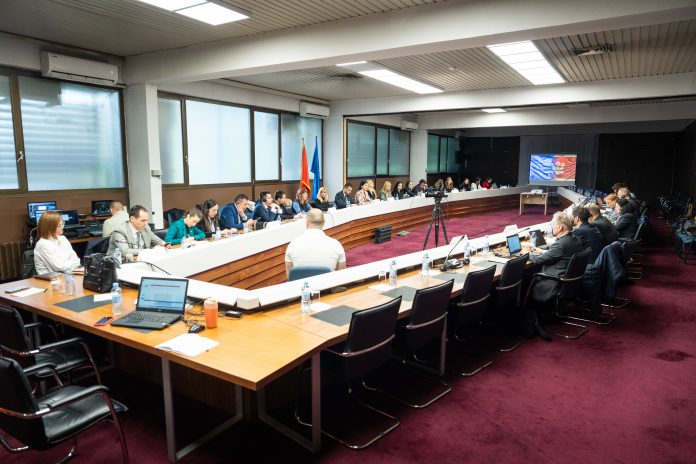The 16th meeting of the Subcommittee on Internal Market and Competition between Montenegro and the European Commission was held today in Podgorica. The meeting was opened by Montenegro’s Chief Negotiator, Predrag Zenović, and the Director-General of the Directorate for International Cooperation, European Integration, and the Implementation of EU Funds, Ivona Savićević. On behalf of the European Commission, the meeting was co-chaired by Heinke Veit, Deputy Head of the Unit for Montenegro and Bosnia and Herzegovina at the Directorate-General for Enlargement and Eastern Neighborhood.
“The EU Single Market is not only an economic concept but also a political project aimed at bringing European nations closer together through common standards, rules, and values,” said Chief Negotiator Zenović at the Subcommittee, highlighting that it is one of the most ambitious and important projects of European integration and that Montenegro sees it as an opportunity for a new era of its economic development.
“Competition, on the other hand, ensures that this space remains dynamic, innovative, and sustainable, without monopolies, with equal rules for all. Together, these two ideas or principles represent the foundation of every social and personal advancement and prosperity,” Zenović added.
“Montenegro is making great efforts on its path to EU membership. It has an ambitious plan, and this is the momentum we must seize, on both sides,” said Heinke Veit, Deputy Head of the Unit for Montenegro and Bosnia and Herzegovina at the Directorate-General for Enlargement and Neighbourhood Policy. She emphasized that the negotiation process remains merit-based, and the progress in Chapters 23 and 24 will set the pace of the entire process.
“Broad political consensus, unity and focus are the only way to meet all the closing benchmarks for negotiating chapters. To that end the Commission welcomed the agreement reached on 15 March to resolve the constitutional dispute.”
Veit added that the process needs to be further intensified and expressed confidence that by the end of the year, six negotiation chapters will be closed. She also congratulated Montenegro on its accession to the Single Euro Payments Area in November 2025 and noted that Montenegro’s efforts have been recognized in Brussels.
The Chief Negotiator informed that Montenegro has continued its strong reform processes in the negotiations with the European Union, achieving significant progress in aligning its legislation with the EU acquis in key areas. He reported that work was ongoing regarding e the right of establishment and freedom to provide services (Chapter 3) with two key laws on professional qualifications are near completion, and efforts are underway to improve the Single Contact Point. Regarding the free movement of capital (Chapter 4), he mentioned that Montenegro has submitted comprehensive documentation on four key laws to the European Commission, and an analysis is expected from the relevant directorate.
In the area of public procurement (Chapter 5), he highlighted the high level of alignment with EU standards as a result of years of reforms, which has laid the foundation for the provisional closure of this chapter, sending a strong signal to the economy and citizens that public funds are being spent responsibly in a transparent way. The Chief Negotiator explained that communication with the European Commission intensified in the area of company law (Chapter 6) focusing on aligning national legislation with the Eu acquis with the aim of provisionally closing this chapter by the end of 2025.
Zenović pointed out the progress made in Chapter 7, which relates to intellectual property rights, emphasizing that its closure at the last intergovernmental conference confirmed Montenegro’s commitment to innovation, creativity, and the protection of intellectual property. He also mentioned progress in the area of competition (Chapter 8), through strengthening the capacities of the Competition Protection Agency and the judiciary, along with the implementation of an Action Plan to further develop the regulatory framework.
Zenović reminded that in the domain of financial services (Chapter 9), a significant number of laws have been adopted, and new regulations are expected to be passed by the end of second quarter, which will allow the closure of this chapter. Finally, the Chief Negotiator noted that progress in the area of consumer protection and health (Chapter 28) is evident in the adoption of key strategic documents, the development of healthcare, healthcare quality, and digital health.
MINISTRY OF EUROPEAN AFFAIRS


